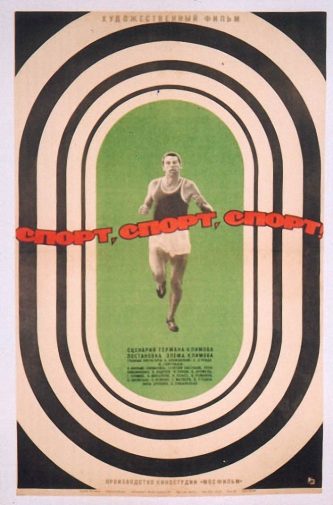 Playful is the word for this Soviet era quasi-documentary from the late Elem Klimov (1933-2003). That Klimov, one of Russia’s greatest filmmakers (see AGONY and COME AND SEE), was a lifelong sports enthusiast is evident throughout SPORT, SPORT, SPORT (Спорт, спорт, спорт; 1970), which is about just what the title portends.
Playful is the word for this Soviet era quasi-documentary from the late Elem Klimov (1933-2003). That Klimov, one of Russia’s greatest filmmakers (see AGONY and COME AND SEE), was a lifelong sports enthusiast is evident throughout SPORT, SPORT, SPORT (Спорт, спорт, спорт; 1970), which is about just what the title portends.
Of the film Klimov subsequently admitted that “I didn’t take it very seriously.” That explains its whimsical bent, and, possibly, the fact that it was unsuccessful, never receiving much of a release outside the film festival circuit. Yet SPORT, SPORT, SPORT, scripted by Klimov’s retired athlete brother German, is a mighty interesting failure.
Proclaiming itself “A few stories from the stadium, its stand and underneath them,” the film consists largely of vintage documentary footage of sporting events, much of it humorous and bizarre in nature, mixed with staged footage—swimmer’s POV shots of the bottom of a pool, historical flashbacks, a fantasy Olympics in which art and athletics are combined in a Heironymous Boschian spectacle (a motif that’s extended to the film’s most overtly bizarre portion, in which contorted sportsmen’s bodies are juxtaposed with the surreal distortions of Dali paintings), etc. Also featured are interviews with various Russian folk—soldiers, miners, businessmen, housewives—discussing their thoughts on all things sport-related, and appearances by filmmaker Nikita Mikhalov and Klimov’s late wife Larisa Shepitko.
Intercut with all this are the exploits of a kids’ swimming team and a boxing troupe coached by a (fictional) masseuse known as Uncle Volodya (played by actor Georgiy Svetlani). The latter is seen passionately lecturing his players, discussing his ability to cure injuries with birch leaves, and regaling us with how he “saved” a felled player, a freakishly tall basketball star named Tolya.
Off-screen narration is constant, with one such narrator feeding us sporting statistics (such as the fact that economic productivity tends to increase when the peoples’ favorite sports teams win). Another voice emotes from Volodya, who discusses his work on sportsmen’s bodies, and serves as the closest thing this film has to a protagonist.
We also get portraits of the Soviet high jumper Valeriy Brumel, who set a new world record but injured himself severely, and Jesse Owens, who even though he ran for the USA (the enemy) is given plaudits for beating out the Nazis at the 1936 Berlin Olympics.
The film overall stands as a potent early showcase for Klimov’s montage editing skills (later displayed in the 1980 docu-short LARISA). It is essentially a structure-less 85 minute montage that juxtaposes a satiric sense that has a tendency to mock the sports figures it’s ostensibly celebrating (as when a close up of a woman gymnast’s face is juxtaposed with the Mona Lisa and other famous paintings) with a near-psychedelic experimental bent (as in the repeated shots of the injured Brumel attempting to make a high jump over and over). It is, in short, very much a product of the era in which it was made.
With such a crazy quilt approach the film’s take on its subject (if there even is one) ultimately adds up to very little. But even Klimov’s misses are worthwhile, and there’s much to enjoy, and learn from, in SPORT, SPORT, SPORT.
Vital Statistics
SPORT, SPORT, SPORT (Спорт, спорт, спорт)
Mosfilm
Director: Elem Klimov
Screenplay: German Klimov
Cinematography: Boris Brozhovsky, Yuri Skhirtladze, Oleg Zguridi
Editing: Valeriya Belova, G. Ginzburg
Cast: Zinoviy Gerdt, Georgiy Svetlani, Yelena Novozhilova, Vladimir Andreyev, Vladimir Lyakhov, Valeri Brumel, Nikita Mikhalov, Igor Klass, German Klimov, Boris Romanov, Larisa Shepitko, Adolph Hitler, Jessie Owens, Alberto Sordi
